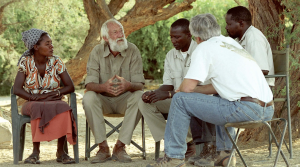Indigenous, non-indigenous campaigners and experts who attended the world’s first Our Land Our Nature Congress released a manifesto calling for a total halt to the creation of new Protected Areas that threaten human rights. Our Land Our Nature was held in Marseille in September as a counterpoint to the IUCN’s much larger World Congress, which attracted mainly mainstream NGOs, some of which have financed, encouraged and covered up human rights abuses. The IUCN’s event was backed by corporations, billionaires and governments who are pursuing, in cooperation with environmental NGOs, the 30×30 plan, which will, at best, curtail the human rights of aboriginal, rural and coastal communities. Or, at worst, expel millions of impoverished people from their homelands, while denying them access to the oceanic resources that their livelihoods and food security depend upon.
The “Marseille Manifesto: a people’s manifesto for the future of conservation” supports and promotes human rights and opposes the IUCN’s authoritarian conservation strategies, which initiate neo-colonialism and racist policies in the underdeveloped and most biodiverse regions of the world. Hence, IWMC is more than pleased to publish the Our Land Our Nature manifesto here to encourage debate about its content and objectives.
The manifesto
Planet Earth, our home, is facing an unprecedented loss of biodiversity and an
acceleration of climate change, which threatens the future of humanity and every other form of life.
The only sustainable, just and real solutions to these crises also lie with humanity – in particular, with Indigenous Peoples and local communities, who are the best guardians of biodiversity, and with a model of conservation that puts human rights and human diversity at its center. We need a conservation model that fights against the real causes of environmental destruction and is prepared to tackle those most responsible: overconsumption and exploitation of resources led by the Global North and its corporations.
On the contrary, many governments, together with business and the conservation industry in Western countries, refuse to address the real roots of the problem and pretend to provide a path forward by calling for more Protected Areas and vague ‘nature-based solutions’. These false solutions are being promoted as ‘real’ solutions to solving the climate crisis facing the world today.
Yet decades of research and experience have shown that the mainstream approach to biodiversity conservation has had a devastating impact on Indigenous and other local people’ lands, livelihoods, and rights. This has largely been based on the flawed thinking that believes in ‘nature’ devoid of human presence. This single-minded focus has led to a model of conservation that is often violent, colonialist, and racist in approach – seizing and militarizing the land, criminalizing and destroying the ways of life, of Indigenous and local communities, while ignoring their knowledge. This model, despite the pain it causes, has never prevented the destruction of the ecosystems that it claims to be protecting.
Even ‘reforms’ that claim to avoid the worst excesses of such ‘fortress conservation’, are usually only cosmetic and only include Indigenous and local people as an afterthought, or as subsidiary to the principal goal, in ways that still violate international standards on the rights of Indigenous Peoples and other local communities1. These attempted reforms are routinely revealed to be nothing more than window dressing because they focus on the implementation of a single project, while failing to acknowledge that the problem is structural. The underlying model of conservation is thus still far from being rights-based. On the contrary, it increasingly relies on a neoliberal approach in which both nature and people are defined as forms of ‘capital’ whose value is decided by the market. It fails to address the underlying causes of biodiversity loss in the rampant expansion of a growth-oriented industrial economy, and even encourages them.
While the conservation industry benefits from this model, using taxpayer and philanthropic money to fund more Protected Areas will continue to be catastrophic for both biodiversity and people. The demands we have listed below entail the dismantling of this model, because we believe that positive change can only be achieved by a new model, not changes in the implementation of a flawed one. (See the United Nations Declaration on the Rights of Indigenous Peoples and the United Nations Declaration on the Rights of Peasants and Other People Working in Rural Areas.)
By far the most effective and just way to fight against biodiversity loss and climate change is to respect the land rights of Indigenous Peoples, who already protect 80% of the world’s biodiversity, and other local communities. This fact is acknowledged in many policies and declarations, but action ‘on the ground’ continues to dispossess and mistreat them.
We hereby declare that:
- The international community must agree to a complete halt in the creation of new Protected Areas which exclude Indigenous and local communities;
- Governments must fully respect, protect and uphold Indigenous Peoples’ land and forest rights, respect collective customary land and forest use by local communities, to ensure protection of that land in accordance with their wishes; this should be the primary means of protecting biodiversity throughout the world;
- Governments and conservation organizations must not embark on any conservation projects without the full Free, Prior and Informed Consent (FPIC) of the communities concerned;
- Conservation organizations must be subject to regulations and adhere to prescribed codes of conduct like all other professional fields to ensure that conservation is not an ‘end’ which justifies any means employed to achieve it;
- Governments and conservation organisations must acknowledge the huge toll that strictly protected conservation areas have taken on the lands, livelihoods and rights of many communities worldwide; they must make concrete plans for reparations of past wrongs, including through transferring control back to the historical and local guardians;
- High income countries must provide financial resources to support these changes to take place, and must cease funding conservation programmes which destroy local people and livelihoods, including by failures of FPIC, irrespective of whether this is intentional or not;
- Industrialised nations must agree to reductions – and not merely shifts – in extraction of resources for production and consumption, and enforce these on their corporations, in order to reduce their impact on the natural world;
- Governments and corporations must phase out fossil fuels, and abandon attempts to greenwash their emissions through false claims that ‘nature-based’ offsetting will mitigate climate change;
- Multinational corporations and conservation organisations must adhere to and be held to international standards when they operate outside their own countries or through suppliers, including on FPIC;
- Multinational corporations and conservation organizations must exercise human rights due diligence to identify, prevent, mitigate and account for how they address impacts on human rights. They must implement effective grievance and redress mechanisms for victims of human rights violations related to their activities;
- Environmental and climate policies – whether domestic or international – must be designed and assessed in terms of social justice as well as environmental sustainability. Our shared goal must be to achieve just, equitable, sustainable well-being for humans and other species on our shared planet.
People and nature are inseparable and protecting nature should be part of the bigger issue: how we live and how we create a world in which a healthy life is possible for everyone.
Note: the PDF below contains the manifesto in French, Spanish and German.



